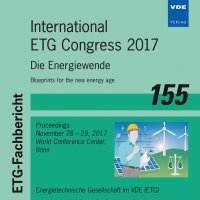Energy Transition in Germany: Five consistent scenarios to frame un-certainty up to 2035
Conference: International ETG Congress 2017 - International ETG Congress 2017
11/28/2017 - 11/29/2017 at Bonn, Deutschland
Proceedings: International ETG Congress 2017
Pages: 6Language: englishTyp: PDF
Personal VDE Members are entitled to a 10% discount on this title
Authors:
Bauer, Roland; Koebinger, Thomas (50Hertz Transmission GmbH, Berlin, Germany)
Schuster, Henning (e-bridge consulting GmbH, Bonn, Germany)
Abstract:
The energy transition in Germany is in full swing (“Energiewende”). Over 30 percent of national power consumption is already covered by renewable energy sources (RES). Within the 50Hertz control area, this already attained a share of 49 percent in 2015. However, the further course of development of the energy transition is uncertain: how fast will RES continue to grow? Will prosumer models with photovoltaic (PV) installations and small storage units characterise the energy landscape? Or will most of the renewable power be generated by large RES installations in productive locations as a result of tenders? Or is an “incomplete energy transition” scenario most probable, where the lack of public acceptance prevents reaching the political targets? With a view to these uncertainties, future grid development should therefore be flexible enough to enable different energy transition models and enable the transition of the energy system Germany - embedded in consistent developments across Europe. To ensure flexible and robust investment planning, 50Hertz elaborated the “Energiewende Outlook 2035”. Scenarios of the future energy landscape were developed and their impact on power transmission were analysed in order to frame the uncertainty for the future development of generation and load. The authors present the essential methods and results of the project and show a methodical approach to minimise the risk of investments that might prove unnecessary later.


